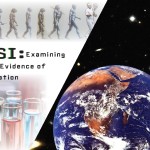Apr 28, 2013
CSI: Examining the Evidence of Creation – 4. Analyzing the Data
Series: CSI Creation
 Evidence is just data. What’s important is how one interprets the data.
A company’s financial ledger, for example, is just data. A negative bottom
line may mean that the company is a bad investment or it may be a good
investment – depending on what you believe to be true about that company
and their business practices. Similarly, the beauty and complexity of life
is a fact. Whether it points to haphazard naturalistic processes or the
grand design of a magnificent God depends on how one interprets the data.
Today we will compare some different interpretations of the same data. It
Evidence is just data. What’s important is how one interprets the data.
A company’s financial ledger, for example, is just data. A negative bottom
line may mean that the company is a bad investment or it may be a good
investment – depending on what you believe to be true about that company
and their business practices. Similarly, the beauty and complexity of life
is a fact. Whether it points to haphazard naturalistic processes or the
grand design of a magnificent God depends on how one interprets the data.
Today we will compare some different interpretations of the same data. It
is ours to decide what it implies.
WatchNotesDownloadDateTitle
- Apr 28, 2013CSI: Examining the Evidence of Creation – 4. Analyzing the DataApr 28, 2013CSI: Examining the Evidence of Creation – 4. Analyzing the DataSeries: CSI Creation
 Evidence is just data. What’s important is how one interprets the data.
A company’s financial ledger, for example, is just data. A negative bottom
line may mean that the company is a bad investment or it may be a good
investment – depending on what you believe to be true about that company
and their business practices. Similarly, the beauty and complexity of life
is a fact. Whether it points to haphazard naturalistic processes or the
grand design of a magnificent God depends on how one interprets the data.
Today we will compare some different interpretations of the same data. It
is ours to decide what it implies.
Evidence is just data. What’s important is how one interprets the data.
A company’s financial ledger, for example, is just data. A negative bottom
line may mean that the company is a bad investment or it may be a good
investment – depending on what you believe to be true about that company
and their business practices. Similarly, the beauty and complexity of life
is a fact. Whether it points to haphazard naturalistic processes or the
grand design of a magnificent God depends on how one interprets the data.
Today we will compare some different interpretations of the same data. It
is ours to decide what it implies. - Apr 21, 2013CSI: Examining the Evidence of Creation – 3. Interrogating the WitnessApr 21, 2013CSI: Examining the Evidence of Creation – 3. Interrogating the WitnessSeries: CSI Creation
 In any kind of trial, various witnesses and pieces of evidence are brought
before the judge and/or jury. Their testimony is considered and weighed in
light of all the known and verifiable facts. Some evidence is considered
circumstantial – meaning that what it indicates is not necessarily relevant
in the investigation. The best kind of testimony, however, comes from
eye-witnesses - those who actually saw the event in question. Their
testimony is further strengthened if there are other witnesses who saw the
same things. In some cases, the credibility of a witness is brought into
question. Can they be trusted? In regards to witnesses proposing to tell
an account of creation, we ask the questions: what or who are the
witnesses? Were they really present at the scene? And can their testimony
be trusted?
In any kind of trial, various witnesses and pieces of evidence are brought
before the judge and/or jury. Their testimony is considered and weighed in
light of all the known and verifiable facts. Some evidence is considered
circumstantial – meaning that what it indicates is not necessarily relevant
in the investigation. The best kind of testimony, however, comes from
eye-witnesses - those who actually saw the event in question. Their
testimony is further strengthened if there are other witnesses who saw the
same things. In some cases, the credibility of a witness is brought into
question. Can they be trusted? In regards to witnesses proposing to tell
an account of creation, we ask the questions: what or who are the
witnesses? Were they really present at the scene? And can their testimony
be trusted? - Apr 14, 2013CSI: Examining the Evidence of Creation – 2. Establishing the TimelineApr 14, 2013CSI: Examining the Evidence of Creation – 2. Establishing the TimelineSeries: CSI Creation
 Often we are led to believe that the universe is tens of billions of years
old. Why is it important for the theory of evolution that the world be so
old? Why would it be necessary for humans to inhabit the planet for
hundreds of thousands of years? But what does God say about the timeline of
His creation? Is it really at odds with what we see when studying the
universe, or is it rather a clash of worldviews and assumptions? And if
humans did evolve slowly over a very long period of time, doesn’t that
violate what Scripture says about Adam and Eve and the Garden of Eden?
Often we are led to believe that the universe is tens of billions of years
old. Why is it important for the theory of evolution that the world be so
old? Why would it be necessary for humans to inhabit the planet for
hundreds of thousands of years? But what does God say about the timeline of
His creation? Is it really at odds with what we see when studying the
universe, or is it rather a clash of worldviews and assumptions? And if
humans did evolve slowly over a very long period of time, doesn’t that
violate what Scripture says about Adam and Eve and the Garden of Eden? - Apr 7, 2013CSI: Examining the Evidence of Creation – 1. Securing the SceneApr 7, 2013CSI: Examining the Evidence of Creation – 1. Securing the SceneSeries: CSI Creation
 The Bible is the looking-glass through which people can correctly view the
world. Though not a science book, Scripture does portray the history of
the universe. How the accounts of God’s creation, when death first
corrupted God’s perfect creation, and the global flood are taken by people
today – as either historical fact or mythical accounts – will greatly
influence whether they put their faith and trust in the Bible as the
authoritative word of God. The foundation of the Gospel of Jesus Christ is
the Bible. If the Bible cannot be trusted, then the truth and hope the
Bible proclaims is in vain.
The Bible is the looking-glass through which people can correctly view the
world. Though not a science book, Scripture does portray the history of
the universe. How the accounts of God’s creation, when death first
corrupted God’s perfect creation, and the global flood are taken by people
today – as either historical fact or mythical accounts – will greatly
influence whether they put their faith and trust in the Bible as the
authoritative word of God. The foundation of the Gospel of Jesus Christ is
the Bible. If the Bible cannot be trusted, then the truth and hope the
Bible proclaims is in vain. - Mar 31, 2013Easter 2013 – The Impact of Easter
- Mar 24, 201324 – The CrowdMar 24, 201324 – The Crowd“Hosanna” means “save us now!” Jesus received great praise as he entered into Jerusalem and the people shouted, "Hosanna. Save us, and do it now!" But that day was also the beginning of the end for our Lord, an end that will culminate in the most humiliating of deaths: by crucifixion. Yet we can rejoice, not for a palm parade, but for the truth that after his death, resurrection and ascension, God exalted his obedient and humble Son to the highest place where he receives all glory as King of kings and Lord of lords, having won for us the forgiveness of sins!
- Mar 17, 201324 – The JudgmentMar 17, 201324 – The JudgmentHave you ever had a court make a ruling or issue a judgment in your favor? Against you? Does the memory of the process make you squirm? Courts and judgments make us uncomfortable. You may have heard someone say, “it’s not mine to judge.” That raises the question – whose is it to judge? As Christians we believe that God has the authority to judge. As a “just” judge He judges with truth and integrity. What this means is that all sin and wrongdoing must be punished – including all our sins and failures. The good news is that God isn’t waiting to carry out that Judgment against us. No, He has already carried it out. He executed justice when Jesus was judged guilty and crucified!
- Mar 10, 201324 – The JudgeMar 10, 201324 – The JudgeJudges are often not popular people. When a verdict is determined, the judge is condemning someone to punishment. Good judges have the responsibility to punish wrong doing. In one sense Pilate was a bad judge because Christ did not deserve to die – He had done nothing wrong. But in another sense, Pilate was a good judge because He sentenced Jesus to the punishment that was required – Christ’s death for our sin! Jesus Christ, the True Judge, get’s judged for our wrong doing. Because of that, you and I are forgiven and free. Thanks be to God!
- Mar 3, 201324 – The HearingsMar 3, 201324 – The HearingsIt’s a common phrase used when a person is sworn in for testimony in court: “Do you swear to tell the truth, the whole truth and nothing but the truth?” At the most critical time of determining justice, the truth must be completely and fully heard. Why do we make such a big deal of telling the “whole” truth? It is because as people we are often content to tell and accept “half” truths. Something that is not completely true must necessarily be partly lie. Satan, the father of lies, is the master at mingling lies with truth. In fact the best lies contain some truth! But at Jesus “hearing” before the high priest, the whole Truth comes out: Jesus is the Christ, the Son of God! What difference did that Truth make for Jesus? What difference does that Truth make for us?
- Feb 24, 201324 – The ArrestFeb 24, 201324 – The ArrestPeople sometimes think Christians are wimpy and prudish, or they think we’re "do-gooders" who never get into trouble. But our leader, our master, got himself arrested! Imagine coming upon the scene of a large crowd including the authorities, and one man is at the center… and it’s a Christian – not just any Christian, but the Sunday School Teacher – no it’s the pastor! The question for us today is do you run and hide? Or do you say – "yep, that’s our man… we're with him!?”
- Feb 17, 201324 – The Betrayal
- Oct 7, 2012Happily Ever After – Re-modeling Your MarriageOct 7, 2012Happily Ever After – Re-modeling Your MarriageSeries: Happily Ever After?
 Sometimes our marriages need some extensive remodeling. They have become
boring, outdated, worn. Where can we turn to find a compelling model for
marriage? The Bible tells us about a Bridegroom who models all of the
characteristics that are required for a healthy marriage. But not only is
He an example worth emulating, He is able to restore, redeem and reconcile
when we fall short of the ideal. Today we will look at the character of
Christ and declare the hope that's always available because of His
sacrifice on the cross.
Sometimes our marriages need some extensive remodeling. They have become
boring, outdated, worn. Where can we turn to find a compelling model for
marriage? The Bible tells us about a Bridegroom who models all of the
characteristics that are required for a healthy marriage. But not only is
He an example worth emulating, He is able to restore, redeem and reconcile
when we fall short of the ideal. Today we will look at the character of
Christ and declare the hope that's always available because of His
sacrifice on the cross. - Sep 30, 2012Happily Ever After – Not Your Parent’s MarriageSep 30, 2012Happily Ever After – Not Your Parent’s MarriageSeries: Happily Ever After?Oftentimes the expectations of what a marriage should look like (or shouldn’t look like) are formed by what we saw in our parent’s marriage. How we deal with conflict, the words we use,
 the amount of time we give to
nurture the relationship, even our commitment to marriage itself, all can
be profoundly impacted by what we experienced as children. In fact, our
past can have a huge impact (both good and bad) on our marriage. Today we
will look how our past can shape our identity but also look at Biblical
ways to get past our past when necessary.
the amount of time we give to
nurture the relationship, even our commitment to marriage itself, all can
be profoundly impacted by what we experienced as children. In fact, our
past can have a huge impact (both good and bad) on our marriage. Today we
will look how our past can shape our identity but also look at Biblical
ways to get past our past when necessary. - Sep 23, 2012Happily Ever After – Staying in LoveSep 23, 2012Happily Ever After – Staying in LoveSeries: Happily Ever After?
 We live in a culture that is preoccupied with the idea of falling in love.
Everyone longs to fall in love. Songs and are written about it. Movies are
made about it. But “falling” in love is the easy part. Staying in love is
trickier. Time wears on any relationship, especially marriage. A loving
marriage requires hard work – everyday. It takes constant course
correction. Today we will discover practical, biblical principles for
nurturing a strong, loving marriage.
We live in a culture that is preoccupied with the idea of falling in love.
Everyone longs to fall in love. Songs and are written about it. Movies are
made about it. But “falling” in love is the easy part. Staying in love is
trickier. Time wears on any relationship, especially marriage. A loving
marriage requires hard work – everyday. It takes constant course
correction. Today we will discover practical, biblical principles for
nurturing a strong, loving marriage. - Sep 16, 2012Happily Ever After – Debunking the Marriage MythSep 16, 2012Happily Ever After – Debunking the Marriage MythSeries: Happily Ever After?
 The idea of marriage is filled with so many myths.“ True love comes
naturally.” “I didn’t marry the ‘right’ person." “If only my spouse would
change.” “If you loved me, you would know what I need.” “We can work this
out on our own.” These myths create a mountain of expectations that will
never be met and often leave husbands and wives disappointed, disillusioned
and unsatisfied. Today we will attempt to debunk the myths and offer a
more biblical view of marriage.
The idea of marriage is filled with so many myths.“ True love comes
naturally.” “I didn’t marry the ‘right’ person." “If only my spouse would
change.” “If you loved me, you would know what I need.” “We can work this
out on our own.” These myths create a mountain of expectations that will
never be met and often leave husbands and wives disappointed, disillusioned
and unsatisfied. Today we will attempt to debunk the myths and offer a
more biblical view of marriage.
